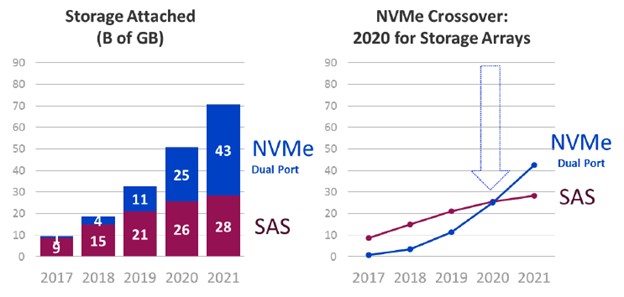NVMe (Non-Volatile Memory Express) is set to revolutionize the performance and density of storage technology, particularly in the realm of AFAs (All-Flash Arrays). In the case of a dual-controller AFA, where two channels are required to access disk data, the utilization of dual-port NVMe SSD becomes essential, like the dual-channel setup of SAS disk drive.
However, the availability of dual-port NVMe SSDs are not off the shelf and is becoming less and less readily available in the market, making it increasingly challenging for customers to procure them through distribution channels. In response to this situation, integrating dual-port NVMe SSDs with storage systems is an overall solution that can better serve NVMe AFA customers. Now, let’s briefly delve into the evolution of NVMe.
SAS SSDs Move to NVMe SSDs
Technically, existing storage systems face performance limitations due to the SAS protocol, originally designed for disk storage, resulting in a serial bottleneck when communicating with flash. The SAS host bus adapter and synchronized locking mechanisms restrict the throughput between the CPU core and flash, impacting all-flash array performance. In contrast, the NVMe protocol over PCIe presents a solution by leveraging extensive parallelism. With support for up to 64K queues and lockless connections, NVMe significantly enhances performance compared to SAS hard drives. This parallel architecture enables faster and more efficient data transfer, addressing the limitations of SAS and optimizing all-flash array operations.

In the market, the native dual-port nature of the SAS SSD interface allows server and HA (High-Availability) storage systems to benefit from the same technology, resulting in a substantial market scale with a ratio of 4:1 (servers to storage). While cost considerations may lead storage end-users to explore solutions provided by drive manufacturers other than the original equipment, it’s important to note that compatibility and performance may vary compared to using original factory drives. However, the extent of variability in these cases is minimal.
The Current Status of the Dual-Port NVMe SSD Supply Chain
With the widespread adoption of NVMe technology, the dynamics have shifted. Server and HA storage systems no longer utilize the same technology, and dual-port NVMe SSDs are now exclusively designed for HA AFAs, catering to a niche market with a reduced scale. Due to the unique characteristics of NVMe, achieving optimal compatibility, performance, and vendor-specific features requires full integration and optimization with each AFA. Consequently, there is no standardized dual-port NVMe SSD that fits all AFAs in the market.
Due to market dynamics and scale, drive vendors primarily adopt an OEM (Original Equipment Manufacturer) and customization market strategy for dual-port NVMe SSDs, rather than pursuing off-the-shelf solutions through distribution channels. Consequently, for storage users seeking the most suitable option in NVMe AFAs, the optimal choice lies in using the original drives of the system. By doing so, users can fully leverage the benefits offered by a comprehensive solution tailored specifically to their needs.
Benefits of Integrating Dual Port NVMe SSD with Enterprise AFA
Integrating dual-port NVMe SSDs with AFAs in a single vendor brings several benefits, including enhanced compatibility and a stable supply. Through rigorous compatibility testing of SSD and its partners, the storage provider can ensure the best performance and reliability. This testing process guarantees that the total solution is seamlessly integrated and functions smoothly with the associated hardware and software components.
Additionally, partnering with reliable suppliers allows for a stable supply of dual-port NVMe SSDs, minimizing the risk of product shortages or disruptions in the supply chain. This stability ensures that customers can confidently deploy and maintain their storage systems without worrying about availability or compatibility issues, resulting in a more streamlined and efficient storage solution.
Conclusion
The integration of dual-port NVMe SSDs with enterprise AFAs offers significant advantages. Dual-port NVMe SSDs feature faster data access, lower latency, and load-balancing capabilities that enhance AFA’s overall performance and high availability. While the supply chain for dual-port NVMe SSDs may present challenges, the storage provider strives to address these issues by conducting rigorous compatibility testing and ensuring a stable supply of these specialized SSDs. This commitment to compatibility and availability enables customers to confidently deploy and optimize their storage systems with dual-port NVMe SSDs, achieving superior performance and reliability.



